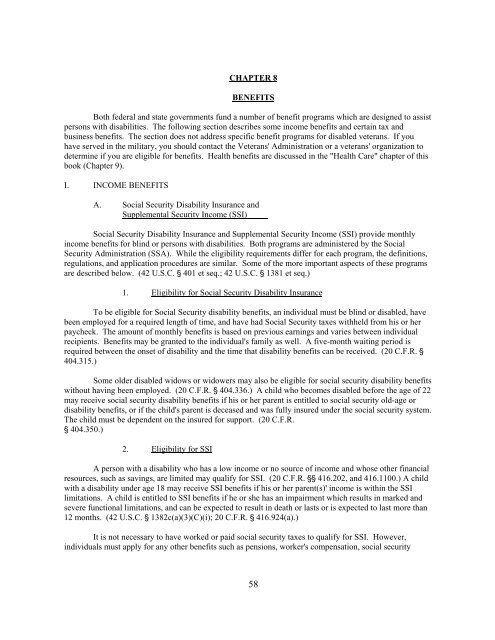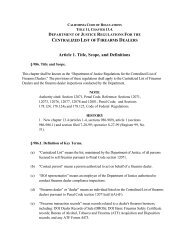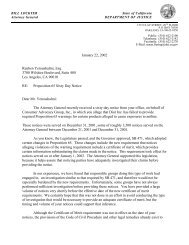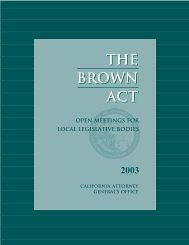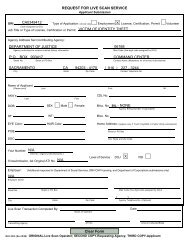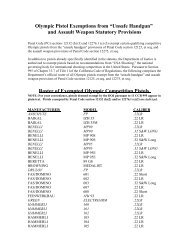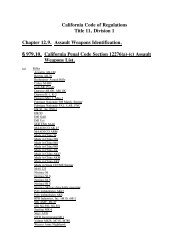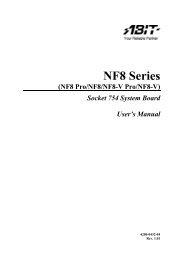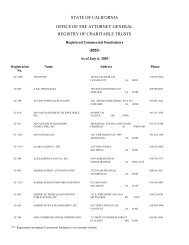Legal Rights of Persons With Disabilities - Ossh.com
Legal Rights of Persons With Disabilities - Ossh.com
Legal Rights of Persons With Disabilities - Ossh.com
You also want an ePaper? Increase the reach of your titles
YUMPU automatically turns print PDFs into web optimized ePapers that Google loves.
CHAPTER 8<br />
BENEFITS<br />
Both federal and state governments fund a number <strong>of</strong> benefit programs which are designed to assist<br />
persons with disabilities. The following section describes some in<strong>com</strong>e benefits and certain tax and<br />
business benefits. The section does not address specific benefit programs for disabled veterans. If you<br />
have served in the military, you should contact the Veterans' Administration or a veterans' organization to<br />
determine if you are eligible for benefits. Health benefits are discussed in the "Health Care" chapter <strong>of</strong> this<br />
book (Chapter 9).<br />
I. INCOME BENEFITS<br />
A. Social Security Disability Insurance and<br />
Supplemental Security In<strong>com</strong>e (SSI)<br />
Social Security Disability Insurance and Supplemental Security In<strong>com</strong>e (SSI) provide monthly<br />
in<strong>com</strong>e benefits for blind or persons with disabilities. Both programs are administered by the Social<br />
Security Administration (SSA). While the eligibility requirements differ for each program, the definitions,<br />
regulations, and application procedures are similar. Some <strong>of</strong> the more important aspects <strong>of</strong> these programs<br />
are described below. (42 U.S.C. ' 401 et seq.; 42 U.S.C. ' 1381 et seq.)<br />
1. Eligibility for Social Security Disability Insurance<br />
To be eligible for Social Security disability benefits, an individual must be blind or disabled, have<br />
been employed for a required length <strong>of</strong> time, and have had Social Security taxes withheld from his or her<br />
paycheck. The amount <strong>of</strong> monthly benefits is based on previous earnings and varies between individual<br />
recipients. Benefits may be granted to the individual's family as well. A five-month waiting period is<br />
required between the onset <strong>of</strong> disability and the time that disability benefits can be received. (20 C.F.R. '<br />
404.315.)<br />
Some older disabled widows or widowers may also be eligible for social security disability benefits<br />
without having been employed. (20 C.F.R. ' 404.336.) A child who be<strong>com</strong>es disabled before the age <strong>of</strong> 22<br />
may receive social security disability benefits if his or her parent is entitled to social security old-age or<br />
disability benefits, or if the child's parent is deceased and was fully insured under the social security system.<br />
The child must be dependent on the insured for support. (20 C.F.R.<br />
' 404.350.)<br />
2. Eligibility for SSI<br />
A person with a disability who has a low in<strong>com</strong>e or no source <strong>of</strong> in<strong>com</strong>e and whose other financial<br />
resources, such as savings, are limited may qualify for SSI. (20 C.F.R. '' 416.202, and 416.1100.) A child<br />
with a disability under age 18 may receive SSI benefits if his or her parent(s)' in<strong>com</strong>e is within the SSI<br />
limitations. A child is entitled to SSI benefits if he or she has an impairment which results in marked and<br />
severe functional limitations, and can be expected to result in death or lasts or is expected to last more than<br />
12 months. (42 U.S.C. ' 1382c(a)(3)(C)(i); 20 C.F.R. ' 416.924(a).)<br />
It is not necessary to have worked or paid social security taxes to qualify for SSI. However,<br />
individuals must apply for any other benefits such as pensions, worker's <strong>com</strong>pensation, social security<br />
58


